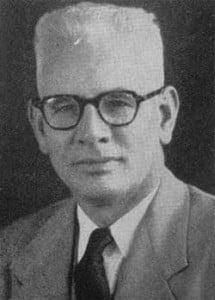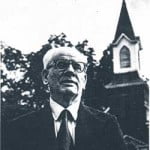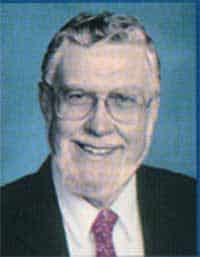EDWARD PORTER HUMPHREY, D.D., L.L.D., was the eldest son of Rev. Dr. Herman and Sophia Port Humphrey, and was born in Fairfield, Conn., January 28, 1809, and died in Louisville December 9, 1886.
He was from one of the oldest English-American families. The first of his ancestors in England were those who followed William the Conqueror from Normandy in 1066. Dr. Herman Humphrey, the father of Dr. E. P. Humphrey, was for twenty-two years president of Amherst College. One can trace in the father’s character and career a marked similarity to the character and career of his eldest son, the Rev. Dr. E. P. Humphrey. Both were eminently successful in the pulpit and in their services among the people. Both were distinguished teachers, excelling in clearness of mind and in lucidity of statement. Both were wide in their sympathies, counting nothing beyond them when their fellow-men were concerned. Each after retiring from active service lived to enjoy the honors and esteem of those whom they had served so faithfully, and yet each was, to the quiet close of an eventful life, untiring in all the labors of which his constitution was capable. One might write of Dr. E. P. Humphrey as was written of his father, “As the years went on the position accorded him in the town was phenomenal.
In connection with many families his relationship was truly patriarchal. Their homes, their tables, their gardens with all they contained of bounty or fruitage were as open to him as if each had been his own. The sick and the dying watched eagerly for his coming, and for the comfort of his ministrations, and when some heavy sorrow fell with crushing weight upon a household the most natural cry seemed to be: `Send for Doctor Humphrey.’”
Dr. Edward Porter Humphrey’s youth was spent in Connecticut. He was prepared for college at the academy in Amherst, Massachusetts, and in 1828 he graduated with honor from Amherst College. In 1831-32 he was principal of the academy at Plainfield, Connecticut. During this time he pursued his theological studies, and in 1833 graduated at the Andover Theological Seminary. His inclination led him to begin his ministry in the Southwest, and during the year 1834 he labored in connection with the Presbyterian church in Jeffersonville, Indiana.
In 1835 he became pastor of the Second Presbyterian church in this city. He gave himself completely up to work in the interest of his church for eighteen years, and his influence was felt, not only in its rapid and permanent growth, but also in a marked degree throughout the city, and in the entire denomination to which he belonged.
Dr. Humphrey, as early as 1852, was elected Moderator of the General Assembly of the then Old School Presbyterian Church, and his sermon, called “Our Theology,” preached at Charleston, S. C., as retiring Moderator, was circulated by the Presbyterian Board of Publication for many years after. Dr. Humphrey preceded Dr. Stuart Robinson as pastor of the old Presbyterian church on Third street, between Green and Walnut, which was afterward converted into a theater, and is now known as the Metropolitan building. His eloquence, when pastor of this church from 1835 to 1853, won him great fame. His discourse at the dedication of the Cave Hill cemetery, in 1848, was rich in eloquence and classical learning, and strong in that faith in immortality which he taught at all time.
In 1852 he received the degree of Doctor of Divinity from Hanover College, Indiana. In 1853 he was appointed by the General Assembly of the Presbyterian Church, professor in Princeton Theological Seminary. This he declined, but soon after he accepted the professorship of Church History in the Theological College in Danville, Ky. It was during the latter years of his residence in Danville, 1851-66, that the exigencies occasioned by the bitter and disastrous civil strife called into prominence many of his distinguishing characteristics. Among these were his unwavering loyalty to the National Government, together with a magnanimity and conciliation of spirit which were potent influences in hastening the return of concord and amity, both in society and in the church. In 1866, in response to an urgent appeal, he returned to Louisville to take temporary charge of a new church made up of many members of the old Second Church, of which he had been pastor for eighteen years. The new organization was called the College Street church. His health, which had begun to fail, rapidly improved on his return to Louisville, and he became permanent pastor of the new church. Under his ministry it became one of the largest and most influential congregations in the city. In 1871 his Alma Mater, Amherst College, conferred the degree of L.L. D., on him. He continued his labors as pastor and preacher until 1880, when he retired from the active duties of his pulpit and was succeeded in the new and handsome church, which his congregation had built, by Rev. Dr. Christie.
After his retirement he engaged in literary and theological work, and spent the remainder of his life among the people to whom he had devoted himself in his early manhood. The positions which Dr. Humphrey occupied demanded rare qualities and gifts, and with these he was peculiarly endowed. His preaching, so distinctive as a simple and earnest presentation of the Gospel, enhanced in attractiveness by convincing argument and impassioned eloquence, made him distinguished as an ambassador of Christ. As a theological teacher his knowledge of history, sacred and profane, and his unique methods of imparting truth not only stimulated the imagination of his pupils, but gave them the philosophy of the subject and stores of definite information. His life covered a period in the Presbyterian church in which great questions of policy and theology were considered, and his power in the discussion of vital subjects, together with the clear and calm judgment he brought to bear upon them, impressed itself with controlling influence upon the great assemblies of the church.
His power was always the greater because of his kindly nature. In advocating measures which seemed to him of great importance one felt that his fervor was inspired by the strength and courage of his convictions rather than by any personal considerations. He was a man greatly beloved by his ministerial brethren and all who knew him, and while zealously devoted to the Presbyterian organization known as the “Old School” so long as it remained separate, he was no less earnest in his work for the unity of the Presbyterian church throughout the land, and foremost in promoting it in special crisis in later life. His theology was always conservative and fully deserved the eminence be attained by a long life devoted to a cause he loved. Dr. Humphrey was of slender figure and of about medium height. His face was expressive of high intelligence.
His general appearance, in spite of his stature, was striking. His voice, until near the end, was strong and clear, but even as he advanced in years he still retained his powers as an orator. His last few years were spent with the family of his youngest son, but he was ready on all occasions to assist with his knowledge and experience all who applied to him. He took the liveliest interest in the College Street Presbyterian church, of which he had been pastor, and the members of that congregation are among those who will most keenly feel his loss. His last public appearance was at the funeral of the late James F. Hubner, when he assisted in conducting the service.
Excerpted from Kentucky: A History of the State, by Perrin, Battle, and Kniffin, 8th ed. (1888). — http://www.rootsweb.com/~kygenweb/kybiog/jefferson/humphrey.ep.txt
 Wick Broomall, Jr. was born on this day, January 31, 1902 to parents Wick Broomall, Sr. and his wife, Annie Nixon Broomall. Their son was educated at Maryville College, graduating in 1925 and then preparing for the ministry by attending Princeton Theological Seminary, from 1925-1929. Loraine Boettner was attending Princeton at that same time. Wick earned the Th.B. degree in 1928 while concurrently earning an M.A. from Princeton University, and he then earned the Th.M. degree in 1929. That was the year that was marked by the reorganization of Princeton Seminary, a change in the governance of the school which allowed modernists to take control and a change which drove conservatives like Robert Dick Wilson, J. Gresham Machen, O.T. Allis, and several other professors to resign in order to start Westminster Theological Seminary.
Wick Broomall, Jr. was born on this day, January 31, 1902 to parents Wick Broomall, Sr. and his wife, Annie Nixon Broomall. Their son was educated at Maryville College, graduating in 1925 and then preparing for the ministry by attending Princeton Theological Seminary, from 1925-1929. Loraine Boettner was attending Princeton at that same time. Wick earned the Th.B. degree in 1928 while concurrently earning an M.A. from Princeton University, and he then earned the Th.M. degree in 1929. That was the year that was marked by the reorganization of Princeton Seminary, a change in the governance of the school which allowed modernists to take control and a change which drove conservatives like Robert Dick Wilson, J. Gresham Machen, O.T. Allis, and several other professors to resign in order to start Westminster Theological Seminary. Rev. Broomall also served churches in Georgia and South Carolina and taught at Columbia Bible College, 1938-51, before transferring his credentials into the Associate Reformed Presbyterian Church and taught at Erskine Theological Seminary, 1952-58, then was received back into the PCUS and pastored the Westminster Presbyterian church in Augusta, Georgia, 1958-69. While serving as one of the founding faculty at the Atlanta School of Biblical Studies, 1971-75, he was also pastor of the PCUS church in Sparta, Georgia, 1972-75, and as one of the founding fathers of the PCA, led the Sparta church in becoming one of the founding churches of the new denomination.
Rev. Broomall also served churches in Georgia and South Carolina and taught at Columbia Bible College, 1938-51, before transferring his credentials into the Associate Reformed Presbyterian Church and taught at Erskine Theological Seminary, 1952-58, then was received back into the PCUS and pastored the Westminster Presbyterian church in Augusta, Georgia, 1958-69. While serving as one of the founding faculty at the Atlanta School of Biblical Studies, 1971-75, he was also pastor of the PCUS church in Sparta, Georgia, 1972-75, and as one of the founding fathers of the PCA, led the Sparta church in becoming one of the founding churches of the new denomination.


